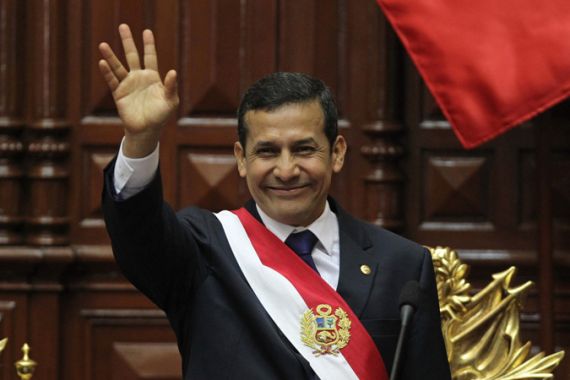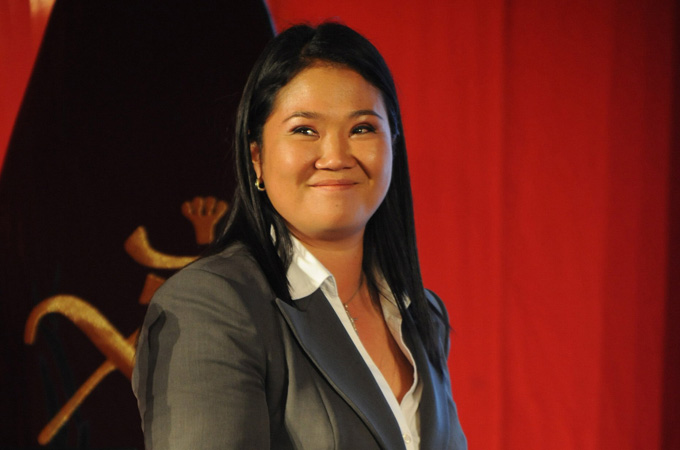Stigmatising feminism in Latin America
Although more women than ever are leading Latin American countries, few of them base their campaigns on women’s issues.

 |
| Peruvian presidential candidate Keiko Fujimori was beaten by her male opponent, Ollanta Humala, after he assailed Fujimori’s father’s campaign of forced sterilisations during the 1990s [EPA] |
As more and more women are elected president in Latin America, one would think that, when running for office, female candidates would advocate for gender equality. Yet female candidates have so far refrained from invoking women’s rights to win elections. In fact, it was a man who first used a feminist argument against his female opponent. Peruvian president Ollanta Humala won a tight runoff race against Keiko Fujimori by focusing his campaign on women’s right to decide over their bodies.
The presidential race between Humala and Keiko was tight until the very end. In the weeks preceding the election, five out of six election polls predicted victory by a small margin for Keiko. Things turned around during a presidential debate on May 29, when Humala brought up Alberto Fujimori’s record of forced sterilisations in the 1990s. Forcing Keiko to take a stand on her father’s policies that violated women’s bodies, Humala catapulted gender issues to the forefront of the presidential race.
Humala thus tackled an issue that received little visibility at the international level but has been extensively discussed in Peru. Between 1996 and 2000, the Fujimori regime executed an aggressive sterilisation programme, imposing quotas on medical institutions and staff. The result was the forced sterilisation of an estimated 300,000 mostly poor women living in rural, indigenous areas.
In 1997, current Peruvian congresswoman Hilaria Supa Huaman, also vice-president of the Indigenous Parliament of the Americas and leader at the United Nations Forum for Indigenous Peoples, was one of the first women to denounce the forced sterilisations. Encouraging witnesses to come forward, she fostered the creation of the Association of Women Affected by Forced Sterilisations of Anta (Cusco) in 2005. Today, the Association, of which over 2,000 women are members, is pursuing legal action both in Peru and in international human rights courts. Damoisel’s documentary “A Woman’s Womb” recently brought the Fujimori programme of forced sterilisations to international attention.
The Fujimori government’s responsibility for the programme of sterilisation was officially recognised in 2003, when Peru and the Inter-American Commission on Human Rights settled the case of Mamerita Mestanza, a peasant who died in 1998 from complications from forced sterilisation.
Despite an official investigation, there have been few sanctions. Alejandro Aguinaga, health minister at the time of the sterilisation programme and Fujimori’s personal doctor, was elected to Congress in 2006 and now serves as that body’s vice-president. A special tribunal in Peru convicted and sentenced ex-President Alberto Fujimori to 25 years for crimes against humanity committed in his battle against the Shining Path guerrilla movement. Victims blame Keiko, who served as Peru’s First Lady after her parents’ divorce, for remaining silent about the forced sterilisations.
Keiko’s response to Humala’s charges during the presidential debate raised a national uproar that played a role in costing her the election. Blaming the medical community, she denied the state’s responsibility. Days later, Rafael Rey, her vice-presidential running mate, acknowledged the errors of the programme and tried to appease critics in a news interview by claiming that sterilisations had not been “against women’s will but without their consent”.
Sterilisation issue won the election for Humala
As the outcry spread, Humala used the case in every public speech in the remaining days before the election. To undermine Keiko’s political credentials, he repeatedly pointed to the irreversible damage done to 300,000 women who were not able to exercise control over their own bodies. Santiago Fujimori, brother of the ex-president and a congressman, identified the mishandling of the issue of forced sterilisations as the core mistake that caused Fujimori’s assured victory to turn into an electoral defeat.
It is incredible that Alberto Fujimori’s programme of forced sterilisations, largely irrelevant in Peruvian politics for 15 years, determined the outcome of this presidential race. It is equally unexpected to see women’s sexual and reproductive rights catapulted to the forefront of an electoral campaign, particularly when deployed by a male candidate against his female opponent. In effect, Humala won the presidential election using a core slogan of Latin American feminism – a woman’s right to decide over her body.
Women’s presence in politics has grown steadily in Latin America over the last decade. Gender quotas have boosted female participation, raising their share of parliamentary seats from an average of 13 per cent in 2000 to 21 per cent in 2010. Even more notable has been the proliferation of female presidents across the region. Political leadership has increased supportive public attitudes. Michele Bachelet, elected as Chile’s first female president in 2005, left office with a record popularity of 83 per cent.
If the region is historically known for its machismo, Brazilian voters have demonstrated that they are largely unconcerned about electing a woman as president. Dilma Rousseff was elected in 2010 with more votes from men than women, although she carried majorities in both genders. In the past five years, Costa Rica, Argentina, and Trinidad and Tobago also have elected women leaders. Today Latin America has four of the world’s 19 female heads of state.
The presence of women in positions of power goes hand-in-hand with policy changes promoting gender equity. Under Bachelet, Chile was the country to report the most progress to the UN Commission on the Status of Women. Since then, other female presidents have expanded women’s economic and political participation through policies such as laws aimed at reducing the gender wage gap, cash transfer programmes that improve women’s economic well-being and citizenship, and parity in national cabinets by naming equal numbers of female and male ministers.
Female politicians shy away from ‘feminist’ label
Yet none of the women presidents was elected on a feminist platform. As strong leaders, often with feminist credentials, they frequently advance women’s rights once in office but do not make gender an electoral focus during their campaigns. To the contrary, women candidates such as Bachelet, today the head of UN Women, generally keep the spotlight off gender equity issues and programmes while campaigning for office. In Brazil, the debate on abortion generated so much heat during the elections that Rousseff dropped the issue, while her female opponent, Marina Silva, an evangelical Christian, took a strong last-minute political stand against abortion to curry favour with voters with traditional values.
As encouraging as it may be to see women’s rights rise to the forefront of electoral campaigns, a closer look reveals there is less to celebrate than appears at first sight. The inclusion of women in politics has not yet led to an explicit feminisation of policy proposals in electoral campaigns. Paradoxically, it is easier for a male candidate to embrace feminist discourse because he is less easily defined as a feminist extremist, especially when he happens to be a former army officer focusing on “motherhood” issues. Rather, sexual and reproductive rights remain a taboo and the stakes of openly advocating feminist ideas remain high.
Whereas Bolivian President Evo Morales succeeded by making indigenous rights a core principle of his campaign and of government policies, female candidates still remain reluctant to advocate for gender equity. At the end of the day, feminist ideas are still perceived to be too radical, and women candidates keep women’s rights under wraps when running for office. When we recognise that gender equity is key to achieving social justice, perhaps feminism will cease to be stigmatised, and will become winning politics.
Manuela Picq has just completed her time as a visiting professor and research fellow at Amherst College. She is returning to the Amazon this autumn to continue her research on indigenous peoples’ rights.
The views expressed in this article are the author’s own and do not necessarily represent Al Jazeera’s editorial policy.
